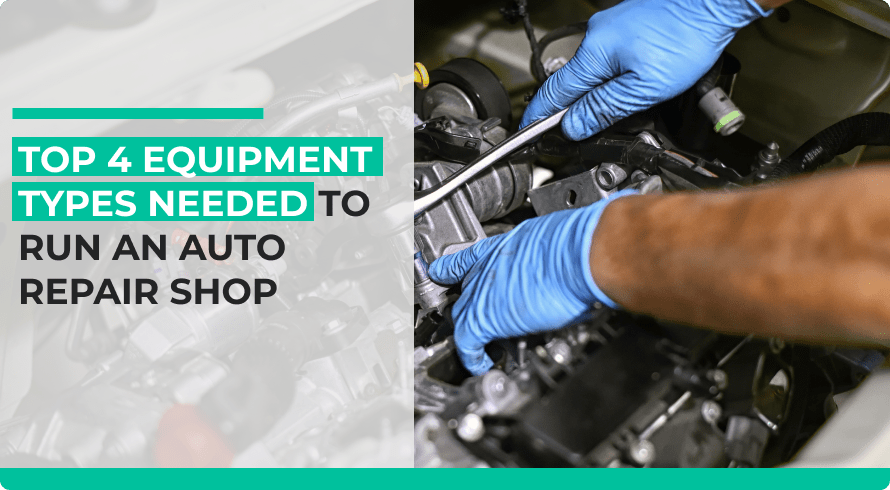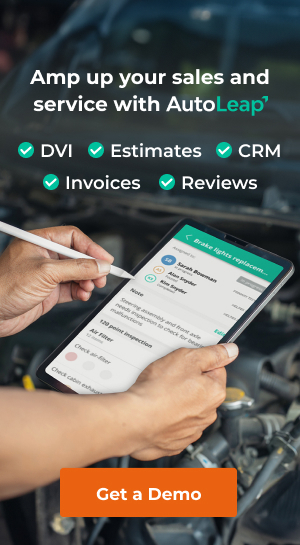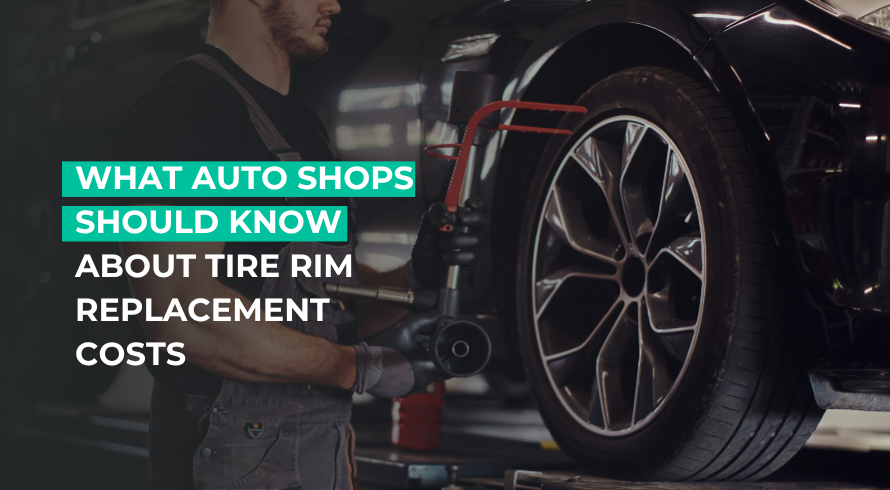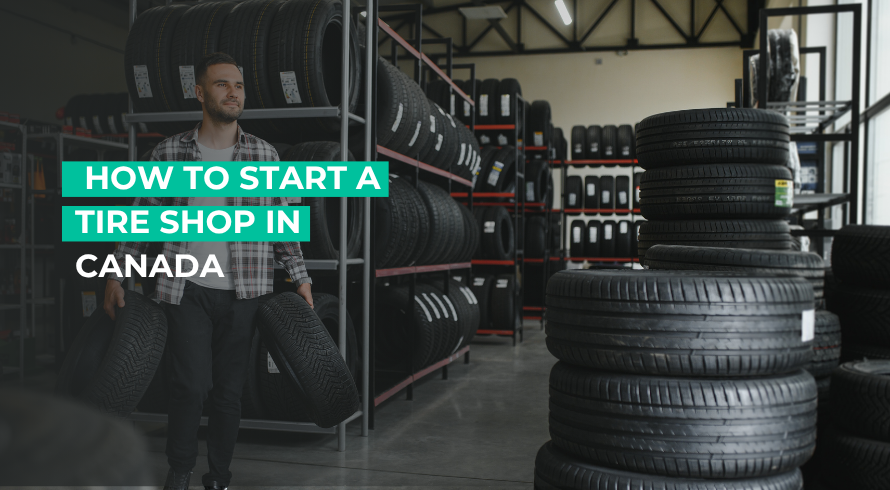Starting your own auto repair shop is never easy—from creating a business plan to finding the right auto repair shop software, and hiring the right people, each step can be a challenge. Before you jump into any auto repair shop equipment list, it’s important to be sure you’ve covered all your bases to start an automotive business!
Ideally, you would want to purchase your mechanic tool set before you begin operating rather than waiting till the need arises! This allows you to take your time and figure out exactly which tools meet your needs and survey the market for the best options available.
Schedule a free demo today!

Boost your shop sales

Simplify shop management

Empower your technicians
Things to consider when choosing auto repair equipment
- What are your financing options? Before you jump into it, make sure you’re familiar with your finances. Purchasing automotive equipment is typically expensive, so it’s important to understand your financing options. You may consider using a business line of credit, a short-term loan or equipment financing particularly for costlier tools. It’s a good idea to invest in quality equipment since it’s performance will impact customer satisfaction and productivity.
- Do the tools fulfill your service requirements? Always consider functionality before you invest in any equipment. If you’re working on vehicles equipped with modern systems like advanced driver assistance systems (ADAS), make sure you buy the tools that’ll be the most effective for the job.
- Are these tools the right fit for your shop? Some tools are larger and trickier to set up than others, it’s important to be sure the auto repair shop you’re buying can accommodate them.
So, where do you begin?
When starting off, it’s difficult to provide all possible auto repair services to your customers. You may have to choose which ones you want to begin with and add on additional services as your business grows! One service you may want to keep an eye on while you expand your business is working on electric vehicles.
The auto shop equipment list below will help you figure out what tools are a good place to start and absolutely essential to have when starting your business!
1. Safety always comes first!
Working with vehicles often involves flammable fluids, an array of tools, and moving parts which makes car repairs tricky with a potential risk of employee injuries. So getting the right protective equipment and being insured against all possible outcomes is essential to your business.
Some essential safety equipment includes:
- Goggles or glasses to protect the wearer’s eyes against chemicals or possible chipping.
- Gloves that may vary based on mechanical work in dry environments vs oily environments.
- Ear protection such as earmuffs or earplugs to protect against loud noise.
- Fire extinguishers must be easily accessible for any potential mishaps.
- Customized uniforms that are tear-resistant and easy to clean.
- Masks to protect against dust or inhalation of chemicals.
2. The essential toolbox!
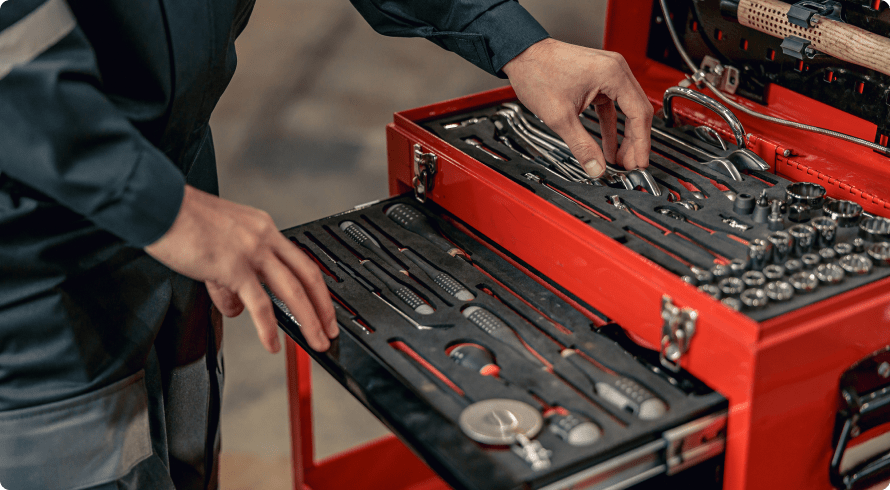
These include the most basic tools and equipment for automotive shops to assist you in your day-to-day tasks and regular maintenance of vehicles. Some of these are standard mechanic equipment that are affordable and easy to find, you may also already have them in your own home!
- Screwdrivers: This may seem like an obvious one but when working with different models of vehicles, it’s essential to cover all your bases. From flat-head to stubby or thin screwdrivers, it’s best to invest in a variety of screwdrivers to ensure you’re always prepared.
- Hammers: Hammers come in a wide array of weights and sizes—each one designed for a specific purpose. Some hammers to keep handy would be claw hammers for prying, machinist hammers to swage metal and dead blow hammers for automotive applications that require great force.
- Wrenches: While investing in a reliable set is advisable, there are two essential wrenches you’d require on a regular basis. Firstly, torque wrenches are crucial to properly tighten any screws and bolts. While an oil filter wrench helps in overcoming the nearly impossible task of removing oil filters. (Tip: Adjustable wrenches are most efficient for the job!)
- Pliers: Almost every job requires some sort of pliers to be used, whether it’s a brake job or removing small electric connectors—it’s always good to keep some handy. Long-nosed pliers are ideal when working in reduced spaces or a jaw plier that can adjust to different sizes based on your requirements!
- Flashlight: Each vehicle has that tricky spot that gets difficult to access, and once you finally do—it can be too dark to work on! Keeping a flashlight handy is always better than risking a job badly done.
- Drain pans: You can never have enough drain pans, all you have to do is simply slide them under any spots that are in spill zones, and they’ll catch any drips and spills, making cleaning up after a job that much easier!
- Electrical tape: While duct tape is always handy to have around to hold things together, some mechanics forget to keep electrical tape around until the need finally arises.
- Brake cleaner spray: Last but not least for your essentials toolbox is the most useful cleaning product! It helps remove any unwanted grease and can be used whenever you conduct any brake jobs to ensure discs are clean from any oil or brake fluid.
3. Services & diagnostic tools
Some common services include air conditioning servicing, oil changes, and recharging dead car batteries. In order to effectively diagnose and repair such problems, the following tools and software can help you save time by making your life easier when working on such problems.
- Battery charger: You’ll notice a lot of the jobs coming your way involve dead batteries or charging issues. While they usually last 3–5 years, people often face problems with their car’s battery due to driving frequency, the charging system or weather and temperature conditions. A battery charger is your only option to charge any car fully. You may also add on a jump starter to add enough battery to allow you to start up the car!
- Multimeter and fuses: Many electrical issues are often simply caused by a blown fuse. Multimeters make your life easier by checking fuses (and more!), saving you hours of frustration. It’s ideal to keep a storage box with at least 5, 7.5, 10, 20, and 30 amp fuses to help you fix almost any car.
- Air conditioning machine: One recommended service for any automotive repair shop is to offer air conditioning services. If you choose to offer these services, then an AC machine is a must. They make flushing and diagnosing AC systems faster, more reliable, and provide convenience when recharging a vehicle’s system.
- Oil drain & oil caddy: Services such as engine oil changes and transmission fluids would require an oil caddy with enough capacity to contain the largest fluid volume. Having a standing oil caddy specifically for raised vehicles on lifts can make your job easier and quicker!
- Wheel alignment equipment: Another standard automobile maintenance service includes wheel alignment where the angles of a vehicle’s tires are adjusted to reduce wear and remain aligned to ensure the vehicle travels straight. The most advanced wheel balancing equipment goes beyond checking the tire assembly—it also guides the technician regarding precisely how much weight they should add to balance the wheel.
- Diagnostic equipment: A car scan tool such as an on-board diagnostic (OBD) code reader can save you a ton of time and help reduce any risks in repairs by running a proper diagnostic before you begin working on a vehicle! OBD scanners help you troubleshoot various systems and features like the engine, emissions, suspension, and more. They won’t just give you a better understanding of the car, they also help in upselling maintenance services your customers may require.
- Auto repair diagnostic software: Besides physical tools, modern auto repair shops can benefit from diagnostic software. They bring efficiency by conducting thorough diagnostics, reducing the potential risks involved in vehicle repairs. Diagnostic software provides comprehensive insights into a vehicle’s various systems and features, including the engine, emissions, suspension, and more. Beyond improving your understanding of the vehicle, these tools empower you to offer essential maintenance services that meet your customers’ needs. With diagnostic scanners, you can enhance accuracy, save time, and elevate the quality of your repair services.
4. Heavy lifting equipment
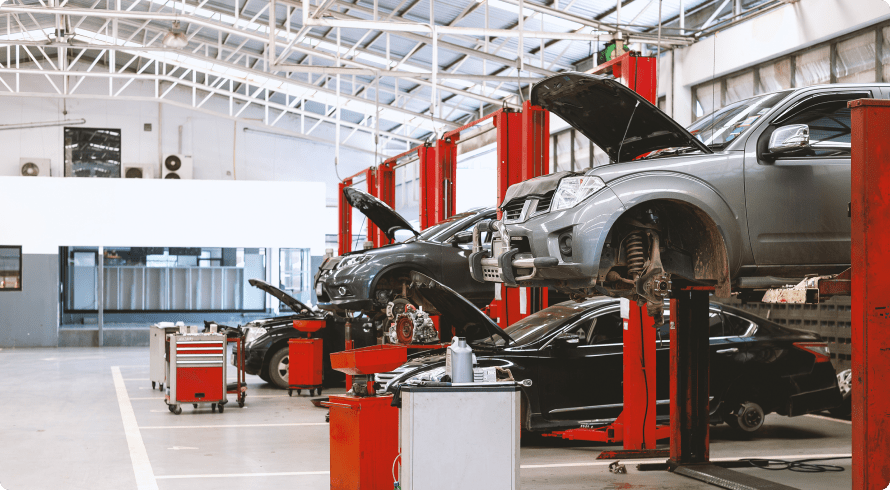
Auto repair work requires a lot of heavy-duty garage equipment (or superhero strength) to lift vehicles or parts while holding them steady to prevent causing any damage. Here are a few essential tools to get you started!
- Vehicle lifts: A vehicle lift is a machine that allows you to elevate a car vertically with adjustable heights. They’re a safe and reliable way to spend long amounts of time working on a car because they’re designed to hold a lot of weight for extended periods of time. By adjusting your vehicle lift to a comfortable height, you can simply tinker away on the underside of a car without any issues. However, it’s important to note that they do come at a cost. A lift is an important investment and should be of the highest quality that’s built to last years. Due to the large size of lifts, it’s important to be sure your auto repair shop premises have an efficient layout that allows wide access and allows you to have a smooth set up.
- Jacks: Jack stands provide a significantly less expensive alternative to car lifts and are available in different heights and weight capacities. However, they wouldn’t be able to elevate a car as high as a car lift and would be more suitable for less intensive maintenance work. One of the most commonly used jacks is floor jacks—they can be easily rolled under the car and come with a long pump handle to raise the vehicle.
- Engine hoist: These are key for your shop and provide immense value for an engine repair. They easily lift an engine block out of your vehicle and are ideal for installing gasoline and diesel motors in crowded engine compartments. Hoists aren’t very expensive and range from between $50–$100 on Amazon. Investing in one will make your life much easier during engine repairs, making them worth every penny. When choosing an engine hoist for your auto shop, keep in mind the weight capacity so it can withstand the weight of your biggest engine. You can also invest in an engine leveler along with your engine hoist to make repairs more convenient.
What’s next?
It may seem overwhelming at first to see an auto repair shop equipment list for your business, but the important thing to remember is no two businesses will be exactly alike. Each auto repair business will have its own specializations and services they provide. Once you have your services lined up, simply see which automobile repair shop equipment works for you and help you manage your business efficiently!
So don’t rush your decision, and take your time to research and find the right equipment that meets your needs and budget the best. Start with the absolute essentials and maintain a list of more equipment you can add on as you grow your business.
Frequently Asked Questions
What tools do auto repair shops use?
Mechanics use a variety of tools to work on car repairs. Popular shop tools include pry bars, wrenches, ratchet & socket sets and hammers.
What are the three categories of tools in automotive?
The three categories of tools for mechanics are safety equipment, heavy-lifting equipment and service & diagnostic tools.
What equipment do you need for an auto shop?
Your auto shop will need equipment for safety precautions, lifting vehicles, completing maintenance and running diagnostics.
What equipment do mechanics use?
Mechanics use many types of equipment to work on vehicle repairs. These include:
- Battery chargers
- Vehicle lifts
- Jacks
- Diagnostic scanners
- Multimeters
What are the appropriate hand tools for automotive servicing?
Hand tools for automotive servicing include:
- Screwdrivers
- Hammers
- Wrenches
- Pliers
- Flashlights
- Drain pans
- Electrical tape

